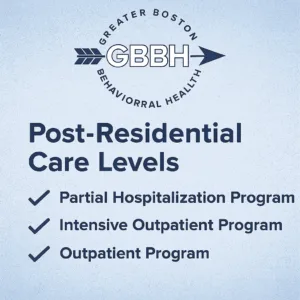You’re not broken. But you might be in a flat spot. Sometimes, after the hardest parts are over, a strange stillness creeps in. You’re not in crisis. You’re not overwhelmed. You’re… functional. But also disconnected. Maybe even a little hollow.
If you’ve been through a Residential Treatment Program in Massachusetts and are still feeling adrift, that doesn’t mean you missed something. It might just mean it’s time to re-engage, not retreat. Sometimes the next level of growth doesn’t look like “getting better.” It looks like getting honest about where you are now—and what support would actually help.
This blog will walk through the different levels of care—residential, PHP, and IOP—and help you map out what might come next when the old tools aren’t quite working anymore.
Residential Treatment: A Foundation That Holds
At its best, residential care gives more than symptom relief. It gives space to breathe. It removes the noise of the outside world long enough for you to reconnect with your own voice—your needs, your patterns, your truth.
Greater Boston Behavioral Health’s Residential Treatment Program in Boston offers:
- 24/7 clinical and therapeutic support
- Onsite psychiatric care and medication management
- Daily group and individual therapy
- Skills-based work that goes deeper than symptom tracking
- A stable, structured environment for mental clarity
This kind of immersive support can be life-changing. But it’s not designed to be permanent. It’s meant to build your internal scaffolding—so that when you leave, you’re not empty. You’re equipped.
Still, recovery is not a straight line. If the stability you once felt is starting to slip, or if your internal world feels quieter in the wrong ways, that might be a cue—not a crisis.
PHP: Intensive Support Without the Overnight Stay
The Partial Hospitalization Program (PHP) is often the most misunderstood level of care. People tend to think of it as “step-down” care. But for many, PHP is a re-centering tool—a way to reconnect with yourself when you’re starting to drift.
PHP typically involves:
- 5 days a week of structured therapy
- Group and individual sessions focused on mental health skills
- Psychiatric support and medication review
- Community connection and peer accountability
- Freedom to return home at night
For alumni feeling emotionally worn or spiritually adrift, PHP can provide the scaffolding to explore deeper work without uprooting your entire life.
Looking for a Residential Treatment Program in Newton, MA? Many of our alumni return to PHP not because they’re in crisis, but because they’re in transition. And that’s a valid reason to ask for more support.
IOP: When You’re Doing “Fine,” But Know There’s More
Intensive Outpatient Programs (IOP) offer a flexible but focused form of care. If you’re working, managing life responsibilities, and still feel emotionally misaligned, IOP might be the level of care that bridges your external success with your internal need.
IOP includes:
- Therapy sessions 3–5 times per week
- Group processing, psychoeducation, and skills work
- Ongoing connection to a treatment team
- Space to process what’s really going on beneath the surface
This is often where long-term alumni do some of their deepest emotional work—not because they have to, but because they’re ready to.
“I Should Be Fine By Now” — The Myth That Keeps Alumni Stuck
It’s easy to fall into the trap of thinking that once you’ve “done” treatment, you should be okay forever. But mental health isn’t a finish line. It’s a landscape you keep exploring. And just because you’re not in a full-blown crisis doesn’t mean everything’s working.
Here’s what disconnection can quietly look like:
- You’re functioning but feel emotionally flat
- You miss community but don’t know how to find it again
- You have insight but lack momentum
- You find yourself pretending to be okay just to avoid questions
You don’t need to justify your pain to deserve help. Sometimes the absence of a clear reason is the reason to check in.
Returning to Care Is Not Starting Over
One of the most common fears alumni share is, “If I go back to treatment, am I just undoing everything I built?”
The answer is: absolutely not.
Returning to care—at any level—is not a regression. It’s reinforcement. Think of it like physical therapy. Even after your muscles heal, they need maintenance. Mental health is no different.
And the truth is, the work you’re doing now might be more nuanced, more internal, and more complex than what you faced the first time around. That’s not failure. That’s maturity.
Looking for a Residential Treatment Program in Needham, MA? Whether you’re seeking stabilization or integration, Greater Boston Behavioral Health can help you figure out the right level of support based on where you are now—not where you think you should be.
FAQ: What Long-Term Alumni Often Ask
Is it normal to feel emotionally flat after treatment?
Yes. Many alumni describe a period of emotional dullness after the intensity of early recovery. It’s often a sign that deeper layers of work are ready to surface—not that something has gone wrong.
How do I know if I need PHP or IOP?
If your day-to-day functioning is intact but emotionally strained, IOP may be a better fit. If you’re struggling to keep up or need more structure, PHP might offer the support you need. We can help you assess which level fits.
Can I return to treatment without a crisis?
Absolutely. You don’t need a crisis to return to care. You just need curiosity, honesty, and the willingness to engage. Support is not something you have to earn by breaking down.
Will people judge me for going back to treatment?
Not here. At Greater Boston Behavioral Health, we see re-entry as strength. Growth isn’t linear—and neither is healing.
Can I keep working or going to school while in IOP?
Yes. IOP is designed to support people with active lives. It offers flexible scheduling and support without requiring a full pause on your responsibilities.
There’s Still More for You
You’ve done the hard work. You’ve built the foundation. But maybe the next chapter doesn’t require more strength—it requires more honesty.
If you’ve been through our Residential Treatment Program and feel like something’s missing, that’s not failure. That’s awareness. That’s the spark of reconnection.
Call (888) 450-3097 or visit to learn more about our Residential Treatment Program services in Boston, Massachusetts.


